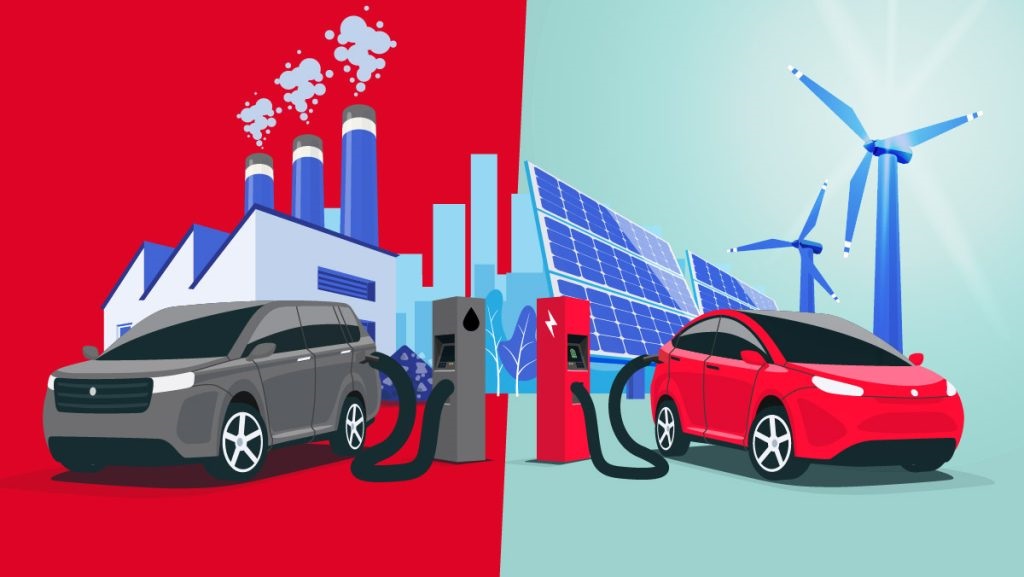The WAR: Electric Cars vs. Gas-powered Cars
This articel is a comparison of electric cars vs. gas-powered cars in terms of cost, convenience, and environmental impact.
Electric cars and gas-powered cars have been in competition for several years, with many people wondering which one is the best option. The debate over which one is better can be quite confusing, especially for those who are not familiar with the technology involved. In this article, we will compare electric cars and gas-powered cars in terms of cost, convenience, and environmental impact.
Cost of Electric Cars vs. Gas-powered Cars
When it comes to cost, electric cars are generally more expensive to purchase upfront than gas-powered cars. However, electric cars have a lower cost of ownership over their lifetime, which includes fuel costs and maintenance. Electric cars are much cheaper to operate than gas-powered cars because the cost of electricity is significantly lower than gasoline. Additionally, electric cars require less maintenance than gas-powered cars because they have fewer moving parts, which means fewer things can go wrong.
As mentioned earlier, electric cars can have a higher upfront cost than gas-powered cars. This is due to the cost of battery technology, which is a key component of electric cars. However, the price of electric cars is decreasing as battery technology continues to improve, making them more affordable. The average cost of electricity in the United States is around $0.13 per kilowatt-hour, which is equivalent to about $1.20 per gallon of gasoline. This means that electric cars can cost significantly less to operate than gas-powered cars over their lifetime.
Gas-powered cars are generally less expensive upfront, but they require more money for fuel and maintenance. Gas prices can be quite volatile, which can make it difficult to budget for fuel costs. Gas-powered cars also require more maintenance because they have more moving parts, which means more things can go wrong. In the long run, gas-powered cars can be more expensive to own and operate than electric cars.
Convenience in Electric Cars vs. Gas-powered Cars
When it comes to convenience, gas-powered cars have the edge. Gas stations are readily available, and it only takes a few minutes to refuel a gas-powered car. Additionally, gas-powered cars have a longer range than most electric cars, which means they can travel farther without needing to stop and recharge.
On the other hand, electric cars require more planning and time for recharging. While charging stations are becoming more common, they are still not as ubiquitous as gas stations. Depending on the car’s battery capacity, it can take several hours to fully charge an electric car, which can be inconvenient if you need to travel long distances. However, with the advent of fast-charging technology, the charging time for electric cars is significantly reducing.
Environmental Impact of Electric Cars and Gas-powered Cars
When it comes to the environment, electric cars are the clear winner. Electric cars produce zero emissions, which means they do not contribute to air pollution. On the other hand, gas-powered cars produce carbon dioxide, nitrogen oxides, and other pollutants that harm the environment. The environmental impact of gas-powered cars is significant. Gasoline combustion produces carbon dioxide and other pollutants that contribute to climate change and air pollution. Additionally, the extraction, refining, and transportation of oil can have negative environmental impacts.
Electric cars, on the other hand, produce zero emissions while driving. This means that they do not contribute to air pollution or climate change. Furthermore, electric cars can be powered by renewable energy sources, such as solar and wind power, which further reduces their environmental impact.
In addition to the environmental benefits, electric cars can also have other societal benefits, such as reducing our dependence on oil and supporting the growth of a renewable energy economy.
Convenience in Electric Cars vs. Gas-powered Cars
The convenience factor is one of the main areas where gas-powered cars have an advantage over electric cars. Gas stations are readily available, and it only takes a few minutes to refuel a gas-powered car. In contrast, charging an electric car can take several hours, depending on the car’s battery capacity.
However, this is changing as more charging stations are being installed, and the technology for fast charging is improving. Additionally, most people charge their electric cars overnight at home, so they wake up to a fully charged car every morning. This means that most people do not have to worry about charging their car during the day, as they would with a gas-powered car.
In conclusion, electric cars are the more environmentally friendly and cost-effective option in the long run, while gas-powered cars have the edge when it comes to convenience. However, with the advancements in electric vehicle technology, the convenience factor is becoming less and less of an issue, making electric cars the clear choice for a sustainable future. As the gas-powered cars have some advantages in terms of convenience, electric cars are the clear choice for a sustainable future. As battery technology continues to improve and charging infrastructure becomes more widespread, electric cars will become an even more viable option for more people.

